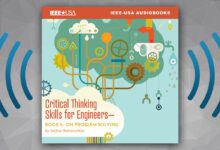
Who Said Engineers Couldn’t Write?!
David Poyer is a best-selling author who writes what is considered genre fiction. In addition to thrillers set in a fictional geography that resembles small towns of the Allegheny region, he has written four underwater adventures. Poyer is best known for a series of novels that follow naval officer Dan Lenson, as he faces a succession of ever mounting threats to his life and career. He has been hailed as the best living American writer of naval fiction, and his work has been compared favorably with masters of the sea novel, such as Patrick O’Brian and C.S. Forrester. Poyer’s work also includes three historical novels based on naval actions during the American Civil War.
A graduate of the U.S. Naval Academy, Poyer begs to differ with those who say engineers can’t write. “We studied what was called naval engineering,” he recalls, “which is basically systems engineering with a focus on things like naval architecture, structures, systems, and things that would fit us for a career at sea.” The Navy gave him plenty of opportunities to hone his engineering skills, installing and debugging missile systems, testing prototype sonar systems, devising strategies to counter nuclear, bacteriological and chemical attacks, and taking part in a staggering number of training and support missions.
The Bad News Is
The claim that engineers can’t write, is a familiar one. When universities survey employers of their engineering graduates, writing and communication skills are often high on the list of areas needing improvement. Training firms and independent contractors stay quite busy offering short courses in writing for the staff of engineering firms, large and small. It could be argued that the profession of technical writing exists, at least in part, from a lack of trust in the writing prowess of engineers.
And engineers, themselves, have openly admitted their struggles with writing.
Of course, some engineers are poor writers. For many, English is not their first, and possibly not even their second, language. Others struggle with the elusive nature of language, finding far more comfort with mathematics, engineering formulas, laboratory exercises, and computer simulations than with gerunds, appositives and semi-colons. And some decline to invest effort in gaining proficiency with written language, feeling, perhaps, that their success will arise from solving problems, not from writing about them.
But the Good News Is Better
It turns out that many engineers are excellent writers, adroit at taking on technology’s toughest challenges, and using language clearly and cogently.
In Engineers Can Write! Thoughts on Writing from Contemporary Literary Engineers, award-winning author and engineer Tom Moran introduces you to engineers of every stripe, who are also award-winning–and much lauded writers of poems, short stories and novels. Each of these engineers has been successful in the world of literature, and their competence with language undermines any claims that engineers can’t write.
Moran’s e-book explores the differences and similarities found within writing and engineering; offers some thoughts on how engineers can conceptualize their writing to improve their reports, articles, proposals and other documents; and, hopefully, shows why engineers, one and all, should be able to write– and write very well-at that.
Get the October Free E-Book for Members
From 1-31 October, you can download Engineers Can Write! Thoughts on Writing from Contemporary Engineers for free, as a member service from IEEE-USA.
And Get the September Free E-Book, Too!
And for the last few days of September, IEEE members may download the September free e-book offering from IEEE-USA: The Best of Today’s Engineer: On Career Survival (Vol. 2). This compilation contains a collection of articles from Today’s Engineer that will be useful to you, regardless of whether you are looking for a job, wondering if you are valued as much as you should be in your organization, or pondering the future of engineering as a vehicle for innovation and productivity.
IEEE members can purchase other e-books on writing from award-winning author and engineer Tom Moran, and other IEEE-USA E-Books, at deeply discounted prices by going to IEEE-USA E-Books. To purchase IEEE members-only products, and to receive the member discount on eligible products, members must log in with their IEEE Web Account.
Call for Authors
IEEE-USA E-Books seeks authors to write an individual e-book, or a series of e-books, on career guidance and development topics.
In particular, we are looking for authors for our new and ongoing series on Shaping an Engineering Career. This series is about the personal journeys of engineers in their careers. Shaping Engineering Career e-books will include personal recollections by engineers and managers who can demonstrate through life experiences the satisfaction from being immersed in their careers.
We want to know what you learned during your career that you wish to pass on to your colleagues. What were your experiences? Who provided guidance? Why did you take the route you did? What were the obstacles, if any?
We want the e-books in this special series to stir the imagination of younger engineers by showing how experienced engineers and managers built their careers, and the issues they confronted. While we have listed specific areas of engineering below, keep in mind there are many types of engineering. E-books should be between eight and ten thousand words:
Book 1: Introduction to the Series (Gus Gaynor)
Book 2: Technological Leadership
Book 3 Engineering Environment: Management’s Expectations
Book 4: Digital Technology: Hardware Engineering
Book 5: Digital Technology: Software Engineering
Book 6: Research
Book 7: Product Development
Book 8: Manufacturing Engineering
Book 9: Equipment Design
Book 10: Systems Engineering
Book 11: Engineers as Innovators and Entrepreneurs
Book 12: Advancing to Management
If you have an idea for an e-book that will educate other IEEE members on a particular topic of expertise, email your e-book proposal to E-Book Chair Gus Gaynor and IEEE-USA Publishing Manager, Georgia C. Stelluto.
Georgia C. Stelluto is IEEE-USA’s publishing manager, editor-in-chief of IEEE-USA in ACTION, and manager/editor of IEEE-USA E-Books.






